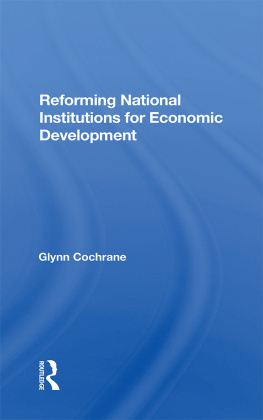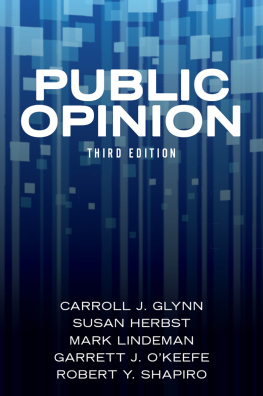Reforming National Institutions for Economic Development
About the Book and Author
Although donor agencies have been concerned about the viability of individual projects in developing countries, less attention has been paid to how well these projects relate to institutions at the national level. Donorsupported projects often become isolated from host government agencies and ministries. As a result, projects are frequently not sustainable because they absorb or require personnel and financial resources that preclude continuation or replication. Dr. Glynn Cochrane argues that it makes sense to ensure that the financial and personnel management systems of these projects have a good fit with national institutions.
In this book, Dr. Cochrane presents various case studies of institutional reform and discusses how the reforms worked in practice. Through an examination of the budgeting process in Zambia, the public service in Papua New Guinea, agricultural programs in Sierra Leone, and rural development in Brazil, he draws lessons and indicates guidelines for institutional reform in developing countries.
Glynn Cochrane, currently the World Bank's adviser on public administration to the government of Papua New Guinea, previously taught at the Maxwell Graduate School, Syracuse University. He is the author of The Cultural Appraisal of Development Projects and Policies for Strengthening Third World Local Government.
Reforming National Institutions for Economic Development
Glynn Cochrane
First published 1986 by Westview Press, Inc.
Published 2019 by Routledge
52 Vanderbilt Avenue, New York, NY 10017
2 Park Square, Milton Park, Abingdon, Oxon OX14 4RN
Routledge is an imprint of the Taylor & Francis Group, an informa business
Copyright 1986 Taylor & Francis
All rights reserved. No part of this book may be reprinted or reproduced or utilised in any form or by any electronic, mechanical, or other means, now known or hereafter invented, including photocopying and recording, or in any information storage or retrieval system, without permission in writing from the publishers.
Notice:
Product or corporate names may be trademarks or registered trademarks, and are used only for identification and explanation without intent to infringe.
Library of Congress Cataloging-in-Publication Data
Cochrane, Glynn.
Reforming national institutions for economic
development.
(Westview special studies in social, political, and
economic development)
1. Administrative agenciesDeveloping countries
Case studies. 2. Public institutionsDeveloping
countriesCase studies. 3. Economic development
projectsDeveloping countriesCase studies.
I. Title. II. Series.
JF60.C64 1986 350.007'8'091724 86-24602
ISBN 13: 978-0-367-28539-5 (hbk)
I owe a considerable debt of gratitude to those who actually did the work on the ground, wrote useful pieces, or provided inspiration: In Sierra Leone, Vijaya Mackrandilal; in Panama, Lizia Lu; in Brazil, Claudio Campos Fell; in Zambia, Peter Hansen and Zachariah Namoya; in Papua New Guinea, Philip Berlin, Nancy Farmer, Benjamin Fisher, Paul Songo, and John Vulupindi. In addition, Pauline Cochrane at home, Jim Kearns in the World Bank, Ed Bock and John Prucha at Syracuse University, all in their various ways provided useful assistance.
Glynn Cochrane
This is a preliminary essay about institutional development directed toward students and practitioners in the field of international development who are interested in recent institution building efforts made by multilateral agencies like the World Bank.
The term "institutional" began to be used by the World Bank toward the end of the 1970s in preference to the term "Public Administration" because some people in the World Bank felt that "Public or Development Administration, Business Administration, and Management Science have made little progress in terms of dealing with institutional issues in developing countries... (The World Bank view was that) institutional development is the process of creating or strengthening the capability of institutions to make effective use of available human, financial and other resources."
Recent experience suggests that more resources from donor agencies should be devoted to improving national institutional processes. Until recently the World Bank used development projects as its principal means of delivering institution-building assistance. Now, more and more, there is increasing concern with national institutional development because national economic management capacity is critically dependent on the efficient functioning of a few key national institutional processes such as budgeting and personnel management.
Government administration reform programs have often tried to do too much because the aim was to secure better functioning of all Government institutions at once. When donors examined ways to promote Government's capacity to stimulate economic development, they found it most effective to be involved in a limited number of target areas for reform.
The majority of this book is taken up with material on the lessons of national institution building and what this means for further work. Some light is also shed on the qualifications and experience needed for this type of work. For those involved in these exercises experience of having worked in an LDC Public Service proved important. Although a social science grounding in general and a knowledge of organization theory in particular is useful, the work reported here should probably be thought of as "administrative technology." To do this work requires entrepreneurial ability, ability to get on with people possessing widely differing rank and status, ability to analyze and grasp detail, and total immersion in the relevant administrative circumstances over a period of years. Also required are teamwork, luck, and a good deal of patience.
In this book the limitations of using projects as the sole means of institution-building are illustrated by examples from Sierra Leone, Brazil, and Panama. Reform of national institutional processes is illustrated by a case on budgeting from Zambia and a case on personnel management from Papua New Guinea. The project examples used in the book not only reinforce the need for national data when designing projects but also highlight the fact that donor projects often exercise very little influence on personnel and financial management practices at the national level.
This book suggests that institutional innovations at the project level and sectoral levels, like agriculture or education, need to be designed with knowledge about the national institutional environment. Project level interventions have disadvantages if they are the only institution-building vehicle used by donors in a country. Because there are financial management and personnel management systems in every project it makes sense, particularly in small countries, to try to ensure that these project systems have a "good fit" with counterpart national institutional processes if they are to be maintained and if replieability is an objective. Where a national institutional perspective is not available, projects frequently fail on measures of sustainability because they have absorbed, or seem to need, personnel and financial resources that preclude continuation or replication.










